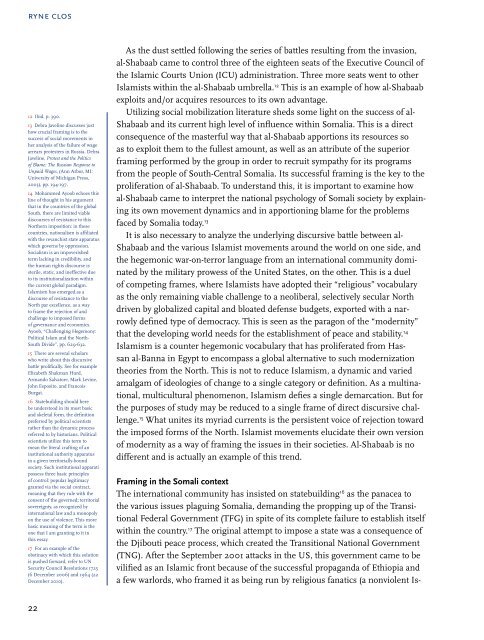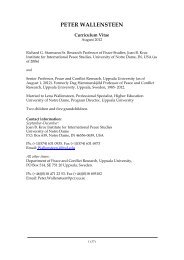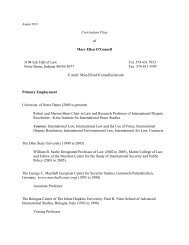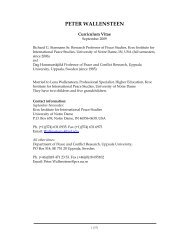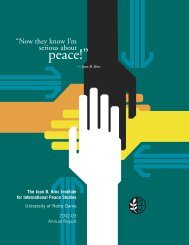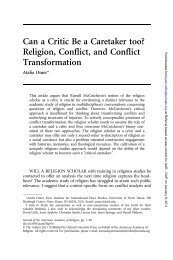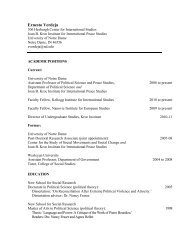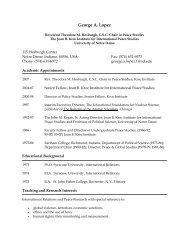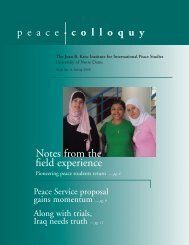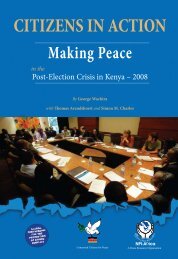Somalia: Creating Space for Fresh Approaches to Peacebuilding
Somalia: Creating Space for Fresh Approaches to Peacebuilding
Somalia: Creating Space for Fresh Approaches to Peacebuilding
Create successful ePaper yourself
Turn your PDF publications into a flip-book with our unique Google optimized e-Paper software.
yne clos<br />
12 Ibid, p. 390.<br />
13 Debra Javeline discusses just<br />
how crucial framing is <strong>to</strong> the<br />
success of social movements in<br />
her analysis of the failure of wage<br />
arrears protesters in Russia. Debra<br />
Javeline, Protest and the Politics<br />
of Blame: The Russian Response <strong>to</strong><br />
Unpaid Wages, (Ann Arbor, MI:<br />
University of Michigan Press,<br />
2003), pp. 194-197.<br />
14 Mohammed Ayoob echoes this<br />
line of thought in his argument<br />
that in the countries of the global<br />
South, there are limited viable<br />
discourses of resistance <strong>to</strong> this<br />
Northern imposition: in these<br />
countries, nationalism is affiliated<br />
with the revanchist state apparatus<br />
which governs by oppression.<br />
Socialism is an impoverished<br />
term lacking in credibility, and<br />
the human rights discourse is<br />
sterile, static, and ineffective due<br />
<strong>to</strong> its institutionalization within<br />
the current global paradigm.<br />
Islamism has emerged as a<br />
discourse of resistance <strong>to</strong> the<br />
North par excellence, as a way<br />
<strong>to</strong> frame the rejection of and<br />
challenge <strong>to</strong> imposed <strong>for</strong>ms<br />
of governance and economics.<br />
Ayoob, “Challenging Hegemony:<br />
Political Islam and the North-<br />
South Divide”, pp. 629-632.<br />
15 There are several scholars<br />
who write about this discursive<br />
battle prolifically. See <strong>for</strong> example<br />
Elizabeth Shakman Hurd,<br />
Armando Salva<strong>to</strong>re, Mark Levine,<br />
John Esposi<strong>to</strong>, and Francois<br />
Burgat.<br />
16 Statebuilding should here<br />
be unders<strong>to</strong>od in its most basic<br />
and skeletal <strong>for</strong>m, the definition<br />
preferred by political scientists<br />
rather than the dynamic process<br />
referred <strong>to</strong> by his<strong>to</strong>rians. Political<br />
scientists utilize this term <strong>to</strong><br />
mean the literal crafting of an<br />
institutional authority apparatus<br />
in a given terri<strong>to</strong>rially-bound<br />
society. Such institutional apparati<br />
possess three basic principles<br />
of control: popular legitimacy<br />
granted via the social contract,<br />
meaning that they rule with the<br />
consent of the governed; terri<strong>to</strong>rial<br />
sovereignty, as recognized by<br />
international law and a monopoly<br />
on the use of violence. This more<br />
basic meaning of the term is the<br />
one that I am granting <strong>to</strong> it in<br />
this essay.<br />
17 For an example of the<br />
obstinacy with which this solution<br />
is pushed <strong>for</strong>ward, refer <strong>to</strong> UN<br />
Security Council Resolutions 1725<br />
(6 December 2006) and 1964 (22<br />
December 2010).<br />
22<br />
As the dust settled following the series of battles resulting from the invasion,<br />
al-Shabaab came <strong>to</strong> control three of the eighteen seats of the Executive Council of<br />
the Islamic Courts Union (ICU) administration. Three more seats went <strong>to</strong> other<br />
Islamists within the al-Shabaab umbrella. 12 This is an example of how al-Shabaab<br />
exploits and/or acquires resources <strong>to</strong> its own advantage.<br />
Utilizing social mobilization literature sheds some light on the success of al-<br />
Shabaab and its current high level of influence within <strong>Somalia</strong>. This is a direct<br />
consequence of the masterful way that al-Shabaab apportions its resources so<br />
as <strong>to</strong> exploit them <strong>to</strong> the fullest amount, as well as an attribute of the superior<br />
framing per<strong>for</strong>med by the group in order <strong>to</strong> recruit sympathy <strong>for</strong> its programs<br />
from the people of South-Central <strong>Somalia</strong>. Its successful framing is the key <strong>to</strong> the<br />
proliferation of al-Shabaab. To understand this, it is important <strong>to</strong> examine how<br />
al-Shabaab came <strong>to</strong> interpret the national psychology of Somali society by explaining<br />
its own movement dynamics and in apportioning blame <strong>for</strong> the problems<br />
faced by <strong>Somalia</strong> <strong>to</strong>day. 13<br />
It is also necessary <strong>to</strong> analyze the underlying discursive battle between al-<br />
Shabaab and the various Islamist movements around the world on one side, and<br />
the hegemonic war-on-terror language from an international community dominated<br />
by the military prowess of the United States, on the other. This is a duel<br />
of competing frames, where Islamists have adopted their “religious” vocabulary<br />
as the only remaining viable challenge <strong>to</strong> a neoliberal, selectively secular North<br />
driven by globalized capital and bloated defense budgets, exported with a narrowly<br />
defined type of democracy. This is seen as the paragon of the “modernity”<br />
that the developing world needs <strong>for</strong> the establishment of peace and stability. 14<br />
Islamism is a counter hegemonic vocabulary that has proliferated from Hassan<br />
al-Banna in Egypt <strong>to</strong> encompass a global alternative <strong>to</strong> such modernization<br />
theories from the North. This is not <strong>to</strong> reduce Islamism, a dynamic and varied<br />
amalgam of ideologies of change <strong>to</strong> a single category or definition. As a multinational,<br />
multicultural phenomenon, Islamism defies a single demarcation. But <strong>for</strong><br />
the purposes of study may be reduced <strong>to</strong> a single frame of direct discursive challenge.<br />
15 What unites its myriad currents is the persistent voice of rejection <strong>to</strong>ward<br />
the imposed <strong>for</strong>ms of the North. Islamist movements elucidate their own version<br />
of modernity as a way of framing the issues in their societies. Al-Shabaab is no<br />
different and is actually an example of this trend.<br />
Framing in the Somali context<br />
The international community has insisted on statebuilding 16 as the panacea <strong>to</strong><br />
the various issues plaguing <strong>Somalia</strong>, demanding the propping up of the Transitional<br />
Federal Government (TFG) in spite of its complete failure <strong>to</strong> establish itself<br />
within the country. 17 The original attempt <strong>to</strong> impose a state was a consequence of<br />
the Djibouti peace process, which created the Transitional National Government<br />
(TNG). After the September 2001 attacks in the US, this government came <strong>to</strong> be<br />
vilified as an Islamic front because of the successful propaganda of Ethiopia and<br />
a few warlords, who framed it as being run by religious fanatics (a nonviolent Is-


